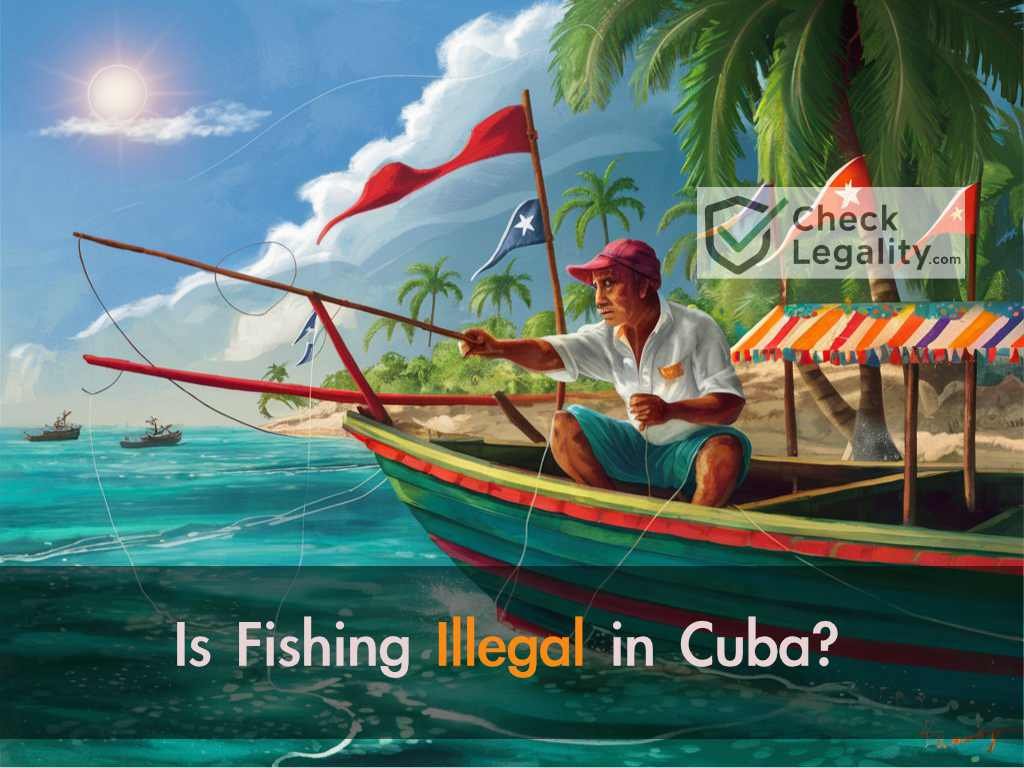Cuba, the island nation known for its vibrant culture, pristine beaches, and rich marine life, has long been a coveted destination for anglers. However, a crucial question arises for those considering a fishing trip to Cuba: Is fishing illegal in Cuba? The answer, like many things in Cuba, is a complex yes or no. A complex web of regulations, economic realities, and historical influences shapes the island’s fishing approach.
A Brief History About Fishing in Cuba
Cuba boasts a prime geographic location at the confluence of the Caribbean Sea, the Gulf of Mexico, and the Atlantic Ocean. This unique position creates a biodiversity haven for marine life, making it a fisherman’s paradise. Historically, fishing played a vital role in the Cuban economy and culture. Indigenous communities relied on fishing for sustenance, and commercial fisheries flourished during the colonial era.
However, the 20th century witnessed a shift. Unregulated commercial fishing practices led to overexploitation of fish stocks. The socialist revolution of 1959 initially aimed to address this issue, establishing state-controlled fishing fleets. While this approach is aimed at sustainability, it faces challenges with inefficient management and declining fish populations.
The Current Fishing Regulations in Cuba
The current situation of Cuba’s fishing industry is largely affected by its history, government control, focus on sustainability, and the appeal of recreational fishing for tourists. Let’s go into these factors:
1. Government Monopoly:
For decades, state-run fishing companies have largely dominated fishing in Cuba. This centralized approach stemmed from a desire to control the nation’s resources and maximize output. As a result, individual fishing licenses for private citizens have historically been scarce. This limited the ability of ordinary Cubans to engage in recreational fishing and benefit from the economic opportunities it could offer.
2. Shifting Tides: Embracing Sustainability:
Recognizing the potential for overfishing and environmental damage, the Cuban government has begun to shift its approach. New regulations have been implemented in recent years with a focus on promoting sustainable fishing practices. These regulations represent a commendable step towards safeguarding the delicate marine ecosystems that support Cuba’s rich fishing stocks.
Here’s a closer look at what these regulations meant:
- Catch Quotas: Establishing quotas for specific fish species helps to prevent overfishing and ensure the long-term viability of these populations.
- Gear Restrictions: Limiting the use of certain types of fishing gear, like highly efficient nets, can help minimize incidental catches and bycatch, protecting endangered species and promoting a more selective fishing approach.
- Fishing Seasons: Implementing designated fishing seasons allows fish populations to replenish during breeding periods, ensuring the long-term health of the fishery.
3. Special Economic Zones (SEZs):
To attract tourism revenue and offer visitors a taste of Cuba’s renowned fishing grounds, the government has designated specific areas as Special Economic Zones (SEZs). These zones, typically located near popular tourist destinations, offer limited opportunities for recreational fishing by foreigners. However, this access comes with a caveat. Fishing within SEZs normally requires obtaining specific permits and licenses through authorized marinas or tour operators. These permits may limit the species you can target, the gear you can use, and the duration of your fishing excursion.
Obtaining a Fishing License in Cuba

Obtaining a fishing license in Cuba can be challenging, especially for independent travelers venturing outside of designated Special Economic Zones (SEZs). But don’t worry—we’ll help you understand these regulations and the best ways to achieve your fishing dream. Here are the reasons behind the hurdles of obtaining a fishing permit in Cuba:
- Government Control: As we mentioned earlier, the government largely oversees Fishing in Cuba. Individual fishing licenses have historically been uncommon for private citizens, which means obtaining one as an independent traveler outside of SEZs can be quite difficult.
- Permitted Zones: If your heart is set on experiencing Cuban fishing, your best bet lies within designated Special Economic Zones (SEZs). These zones cater to tourism and offer limited recreational fishing opportunities for foreigners.
- Authorized Channels: Obtaining a fishing license within SEZs requires going through authorized channels. Reach out to reputable marinas or tour operators specializing in fishing trips within these zones. They will handle the permit and license application process for you.
- Documentation and Fees: Be prepared to provide necessary documentation, such as your passport and potentially proof of travel insurance. Depending on the local fishing authority, they may also request additional documents. Fees for permits and licenses within SEZs can vary, so it’s best to inquire with the specific marina or tour operator beforehand.
Fishing Alternatives to Consider:
- Guided Fishing Tours: Joining a guided fishing tour within an SEZ is a convenient and reliable way to navigate the legalities and enjoy a rewarding fishing experience. Experienced guides will take care of permits, equipment, and ensure you adhere to local regulations.
- Exploring Other Activities: If obtaining a fishing license proves too cumbersome, consider alternative activities that allow you to appreciate Cuba’s beautiful coastline. Explore the vibrant coral reefs through snorkeling or diving excursions, or enjoy boat tours that offer stunning views and glimpses of marine life.
Important Reminders:
- Research is Key: Regulations and license requirements can change, so conduct thorough research before your trip. Reliable sources include Cuban government websites (in Spanish) or consulting reputable travel agencies specializing in Cuban tourism.
- Focus on Sustainability: If you do manage to secure a fishing license, prioritize responsible practices. Choose reputable operators who employ sustainable fishing methods and respect the environment.
- Respect the Law: Fishing outside of permitted areas or without proper licenses can result in fines, equipment confiscation, and even detention. Always err on the side of caution and respect local regulations.
Beyond Legality: The Reality on the Ground
The legal landscape paints one picture, but the reality on the ground can differ in some ways:
- Subsistence Fishing: Subsistence fishing, where locals fish for their consumption, might be more tolerated, especially in rural areas. Regulations may still exist, but as a tourist, I know these gray areas could be black and white. However, it’s best to tread cautiously and, better still, obtain a suitable fishing permit.
- Informal Fishing Activities: Reports suggest some instances of informal fishing activities, particularly for lobster and other commercially valuable species. However, these activities can be risky and carry the potential for penalties.
It’s important to note that the information regarding informal fishing practices can be anecdotal and may not represent the official stance of the Cuban government.
The Cost of Regulations: Economic Considerations
Economic realities heavily influence Cuba’s approach to fishing. The island nation relies on fish as a vital source of food and for export revenue. Balancing these needs with sustainable practices remains a constant challenge.
- Impact on Food Security: Strict regulations can limit fish availability, impacting food security for the Cuban population.
- Tourism Potential: A well-regulated recreational fishing industry could potentially generate tourism revenue. However, striking a balance between economic benefits and ecological concerns is crucial.
Is Fishing illegal in Cuba? – Sustainable Fishing Initiatives
There are positive developments regarding sustainable fishing in Cuba:
- International Collaboration: Cuba participates in international fisheries management organizations, collaborating on conservation efforts for shared fish stocks.
- Aquaculture Initiatives: The development of sustainable aquaculture practices offers an alternative to reliance on wild fish populations.
- Community-Based Management: Pilot programs involving local communities in fisheries management show promise for promoting responsible fishing practices.
Is Fishing Illegal in Cuba? The conclusion
Answering whether fishing is illegal in Cuba is not straightforward and requires more context. However, generally speaking, fishing in Cuba without adequate permits is illegal and a punishable offense by law.
The island nation faces the challenge of balancing economic needs, food security, and environmental sustainability. For travelers, understanding the complexities of Cuban fishing regulations and prioritizing safe and legal fishing practices are crucial for a responsible and enjoyable fishing experience.
In addition, recreational fishing outside of designated SEZs is only permitted for some tourists. However, with proper permits and abiding by the local fishing regulations, fishing within SEZs can offer a unique and memorable way to experience the rich marine life Cuba has to offer.
FAQs: Is Fishing Illegal in Cuba?
General
- Is all fishing illegal in Cuba? No, recreational fishing for tourists is not widely permitted outside of designated Special Economic Zones (SEZs). However, subsistence fishing and fishing for local consumption might be more tolerated, especially in rural areas. Regulations can still apply.
- Can I fish in Cuba as a tourist? Obtaining a fishing license for tourists outside of SEZs can be challenging. It’s generally recommended to fish within SEZs with proper permits and licenses obtained through authorized marinas or tour operators.
Fishing Regulations
- Where can I find the latest fishing regulations in Cuba? Researching current regulations before your trip is crucial. Reliable sources include the Cuban government websites (in Spanish) or consulting with reputable travel agencies specializing in Cuban tourism.
- What are the restrictions on catch limits and gear in Cuba? Regulations regarding catch limits and gear types vary depending on the zone and species. Permits obtained through authorized operators within SEZs will typically outline these restrictions.
Permits and Licenses
- Do I need a permit to fish in Cuba? Generally, yes. For recreational fishing, a permit is required, especially outside of your hotel or resort. Obtaining licenses outside of SEZs can be difficult for independent travelers.
- How can I obtain a fishing license in Cuba? Fishing licenses for SEZs are typically obtained through authorized marinas or tour operators who specialize in fishing trips. Documentation requirements and fees can vary.
Ethical Considerations
- Is it ethical to fish in Cuba? Responsible fishing practices are crucial. Choose reputable operators who prioritize sustainable fishing methods and respect for the environment. Minimize waste and practice catch-and-release techniques whenever possible.
- What are the potential consequences of illegal fishing in Cuba? Penalties for illegal fishing can vary but may include fines, confiscation of equipment, and even detention. It’s best to avoid any activities that could be considered illegal.


